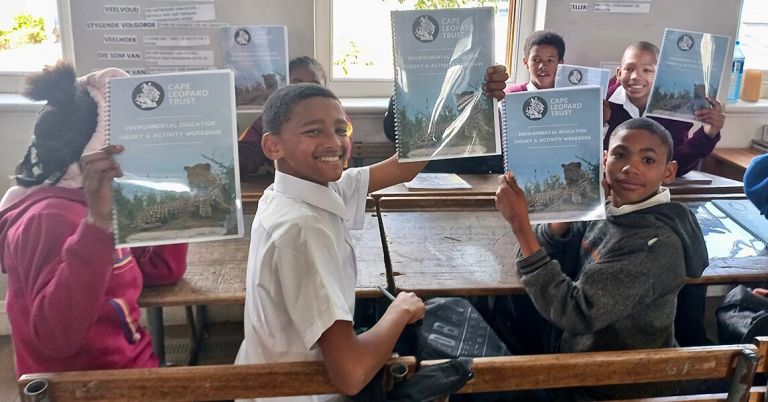One of the Cape Leopard Trust Environmental Education team’s main goals is to educate communities living in leopard areas and create awareness about the importance of protecting leopards and their habitats. One way of achieving this is through our eco-clubs initiative, which consists of lessons to the same group of children throughout a school year to build their knowledge and understanding. Taking a group of learners into nature – even only for a day – may create a lasting memory in the minds of some, but we have found that regular interventions enable us to measure the impact of our work, and in the longer term will enable the monitoring of behaviour change. These repeat contact sessions allow for ongoing interventions to help foster a greater appreciation for leopards, why they are important in maintaining healthy ecosystems, and what leopard populations need to thrive.
The eco-club programme includes four to eight lessons spread over a school year and the lesson topics are tailored to the interests of an individual group. We also provide facilitated educational excursions and wherever possible, the groups are taken on a field trip for valuable practical experience and to appeal to the learners’ sense of responsibility to the environment.
Companies often ask how they can contribute to the Cape Leopard Trust and the protection of leopards for future generations. A brilliant example of how one organisation is taking action is the case of The Royal Portfolio. Their hotel, La Residence, in the heart of the Franschhoek valley, identified a local school, Wes-Eind Primary, to benefit from the CLT eco-clubs programme. Their generous support enabled us to host six eco-club lessons with the school during 2022. Each of the 65 learners in grade 6 received a lesson activity book and we covered topics like biodiversity of the Boland; leopards of the world; the importance of leopards in the fynbos biome; threats to leopards of the Cape, green sector careers, and technology for nature.
It is through philanthropic initiatives like this that the CLT is strengthened in our work to inspire the next generation of conservationists.
For more information on our education work and how you can get involved please contact us at [email protected]

















